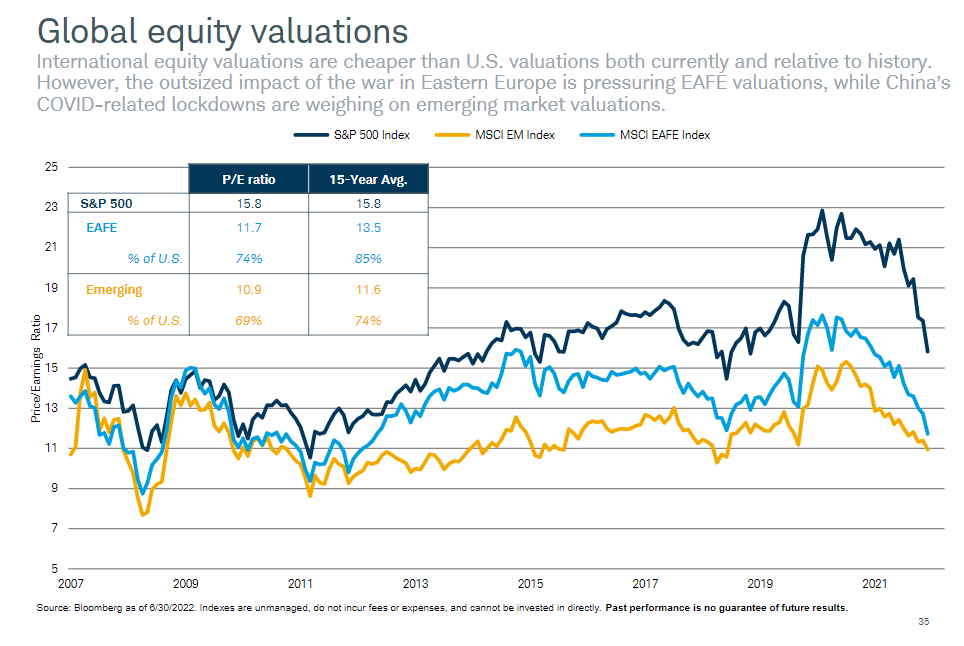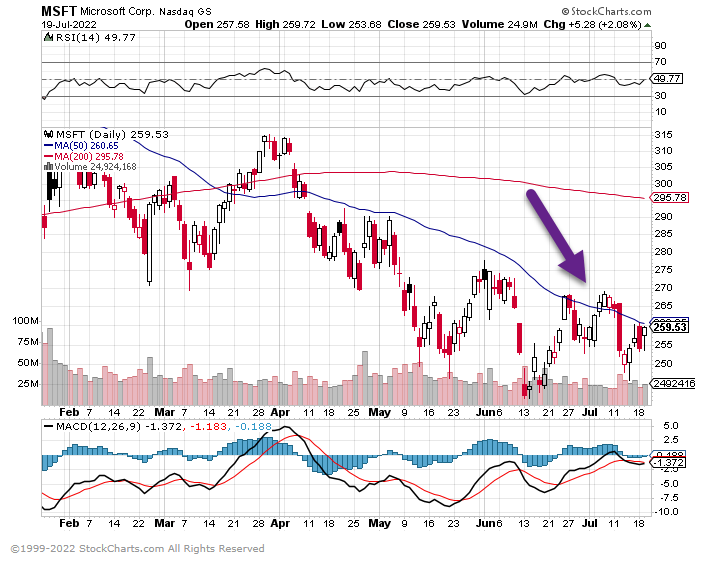1. One-Year Treasury Coupon 3.13%

2. Natural Gas -42% Correction Before July Bounce Back.

3. Banks -33% Correction….Bounce Yesterday

4. XLF Financials ETF 16 Straight Weeks of Outflows.
From Dave Lutz at Jones Trading-The $28.4 billion Financial Select Sector SPDR Fund (ticker XLF) has seen outflows for 16 straight weeks, the longest such streak in its 23-year history, according to data compiled by Bloomberg. Almost $11 billion has been wiped away in that span, shrinking the fund’s total assets by roughly 28%.

5. Netflix Sideways Pattern on Chart Since April…Forming Bottom?

Long-Term Chart on NFLX Show True Damage…$700 to $180

6. Schwab Chart of Updated Global Equity Valuations

7. Microsoft and 200 Day Moving Average
Michael Batnick–Microsoft hasn’t been this far below its 200-day moving average since 2012. https://theirrelevantinvestor.

8. ESG Have Largest Monthly Outflow on Record

Found at Zerohedge https://cms.zerohedge.com/s3/
9. 58% of Americans are living paycheck to paycheck after inflation spike — including 30% of those earning $250,000 or more
KEY POINTS
- With inflation still near 40-year highs, more than half of all Americans are living paycheck to paycheck, according to one report.
- Consumers who are struggling to afford their day-to-day lifestyle tend to rely more on credit cards and carry higher monthly balances making them financially vulnerable.
- Even top earners say they are stretched thin, the report found.
With inflation at 40-year highs, workers across all income levels are having a harder time making ends meet.
As of May, 58% of Americans — roughly 150 million adults — live paycheck to paycheck, according to a new LendingClub report. That’s down slightly from 61% who reported living paycheck to paycheck in April but up from 54% in May 2021.
Even top earners say they are stretched thin, the report found. Of those earning $250,000 or more, 30% are living paycheck to paycheck. (Another recent survey, from consulting firm Willis Towers Watson, estimated 36% of those earning $100,000 or more are living paycheck to paycheck.)
“Consumers have experienced a tough last couple of years as different factors have affected their financial lifestyle, and there seems to be little relief in sight,” said Anuj Nayar, LendingClub’s financial health officer.
With inflation, paychecks don’t stretch as far
The consumer price index, a key inflation gage, rose 8.6% in May from a year ago, the highest increase since December 1981, spurred by surging housing, gasoline and food costs.
Those rising prices meant workers took another pay cut during the month.
When wages rise at a slower pace than inflation, paychecks won’t stretch as far at the grocery store or the gas pump — making it more difficult to cover monthly expenses and set some money aside.
Credit card balances contribute to financial vulnerability
Those struggling to afford their day-to-day lifestyle tend to rely more on credit cards and carry a higher monthly balance, making them financially vulnerable, the survey said.
Overall, credit card balances rose year over year, reaching $841 billion in the first three months of 2022, according to a separate report from the Federal Reserve Bank of New York.
At this rate, balances could soon reach record levels amid higher prices for gas, groceries and housing, among other necessities, according to Ted Rossman, a senior industry analyst at CreditCards.com.
For its part, the Federal Reserve has been hiking its target federal funds rate in an effort to calm runaway inflation.
However, anyone carrying a balance will also see the annual percentage rate on their credit card head higher as the Fed continues to raise rates to try and tamp down rising prices.
10. Arete: The Meaning of Life
I’ll admit that this is an ambitious post title. Thinkers have struggled against this question for thousands of years. One of the interesting things about this question is that the answers don’t converge on a single point. Instead there are many different methods to answer what might be the most important human question.
I’m certainly not going to answer that question in a blog post. Not only would that be incredibly presumptuous of me, but I think it sort of misses the point. Who wants to live a life where you’re handed all the correct answers in advance?
Instead, I’d like to focus on one viewpoint to this problem that I stumbled upon recently. This is a perspective I hadn’t heard before and nicely deals with some of the uncomfortable problems I feel have been brought up with the current Western stance on the problem. This answer to the meaning of life is simply: arete.
What is Arete?
Arete is an ancient Greek word meaning excellence or virtue. The arete of something is the highest quality state it can reach. Using arete as a principle for living life means that you are focused on the quality of everything you do and experience. Avoid actions that lack arete. Take actions that focus on arete.
When most people think of virtue, they look at moral virtue. But arete as a way of describing quality, touches on much more than that. A beautiful painting can have arete, even though it isn’t ethically superior to a dull painting.
I believe arete is a more comprehensive way of viewing life than the two main directions I see from popular Western philosophies.
Happiness or Service? Pick a Side.
I’m grossly simplifying philosophy here (so if you’re well versed in philosophical teachings, hopefully you won’t take offense to my blunt-club treatment of the topic). But in most of the readings I’ve done of major Western views on the meaning of life, I could clump them into two broad categories: happiness or servi
Pursuing Love and Happiness
“Don’t worry, be happy.” – Bobby McFerrin
The first viewpoint is that the ultimate meaning in life is happiness. Not just the naive happiness of short-term pleasure, but the long-term, pursuit of your dreams, happiness. From this viewpoint, your goal should be to maximize your long-term happiness by taking the best actions you feel will reach you there.
As a whole, I don’t feel this philosophy is completely broken. While a few people might be able to achieve happiness without connecting and providing value to the world, I don’t think most could. So the naive view that this philosophy degenerates into addiction and selfishness isn’t valid.
But the problem with this philosophy is that it isn’t always practical. Happiness can often twist on itself when you make it the goal of your actions. Getting the dream job, spouse or million dollars leaves you as unhappy as you were before. Pursuing happiness completely may also feel somewhat shallow as if the entire point of your existence rests on a few neurotransmitters in your brain.
Pursuing Service and Purpose
“At first I thought that life was joy. Then I learned that life was duty. Finally, I acted and, behold, duty was joy.” – Rabindranath Tagore
The second stream of Western thought in my blunt-club look at life philosophies is focusing on purpose and service. This stream of thought usually focuses on helping other people as a means of achieving meaning in life.
Just with our first philosophical stream, the naive view points out that a life devoted to service misses out on happiness. You’re so busy helping others that you don’t have a chance to enjoy life for yourself. I don’t feel this is a valid criticism, because as Tagore said, “duty was joy.” Serve and you will be happy.
But like the other philosophy, I feel this approach suffers from a weakness. The philosophy, if you look at it closely, tends to loop back on itself. The meaning of your life comes from having a purpose. Therefore your purpose is to have a purpose. It doesn’t take too much thinking to wonder whether there is a purpose to your purpose.
I don’t feel this small flaw destroys an entire viewpoint of the world, but it does make it somewhat less useful.
Pursuing Arete
“And what is good, Phaedrus, And what is not good — Need we ask anyone to tell us these things?” – Socrates
Instead of using words like “happiness” or “purpose” I prefer the word arete. Arete, covers the idea that there is an excellence in everything. Pursuing that excellence, whether it creates happiness for yourself or service for others, should be your ultimate goal. I see both happiness and service as being subsets of the larger domain of arete.
Who decides what has quality? I’m not going to touch this question and instead tell you to read Robert Pirsig’s, Zen and the Art of Motorcycle Maintenance. Pirsig believed that quality (or arete) was the underlying substance of the universe, from which both the subjective and objective are derived. Quality creates the mind and it creates the world.
On a more practical level, arete is a nifty word to have. It fits easily in the backpocket of your life philosophy and makes it easier to decide what you should focus on. Instead of focusing on just your total happiness or your total service, you focus on the quality of whatever you do.
Here are a few ways I’ve been trying to incorporate the philosophy of arete into my own life:
- Gym Workouts. To me, strength, speed and flexibility are all signs of arete. Rather than put my emphasis on goals when exercising (from the happiness philosophy) or how being healthy will help me aid society (service philosophy), I focus on quality. Therefore, when I’m at the gym, I try to make my goal to have private excellence: lifting more weight, running faster or working harder.
- Blog Writing. The happiness/service split here would be focusing on writing articles that will get me massive traffic flows or focusing on writing articles that will provide immense value to people. Instead I’d like to focus on arete–making each article the best expression of an idea that I can within the constraints.
- Relationships. Instead of focusing on how people can help me, or how I can help people, focus on arete. What is quality in a relationship? My guess would be connection, sharing, loyalty, deep conversations or laughter.
- Knowledge. I’m reading through The Wealth of Nations right now for fun. The book is difficult to read and requires more effort than a more entertaining novel. Why am I reading it? Because, for me, this book has arete. It represents a significant leap forward in human thought and I want to be a part of that journey Adam Smith started.
- Food. Instead of eating for taste, weight goals or even long-term health, eat for arete. Eat the foods that have quality to you. This applies both in taste and nutrition. Eating greasy junk or cardboard-flavored health snacks both fail my model of arete.
- Speech. Are your sentences peppered with um’s and ah’s? Do your words have clarity and meaning, or do you not know when to shut up? I’ve been trying to debug my communication patterns to help fit in with this model of quality.
These are just a few examples, but I thought I’d like to demonstrate a few of the practical applications from a life philosophy. I like to view philosophies to be like algorithms for life. If you have a great algorithm, you can solve problems with few flaws. Arete, while it isn’t perfect, is a fantastic algorithm for life.
https://www.scotthyoung.com/